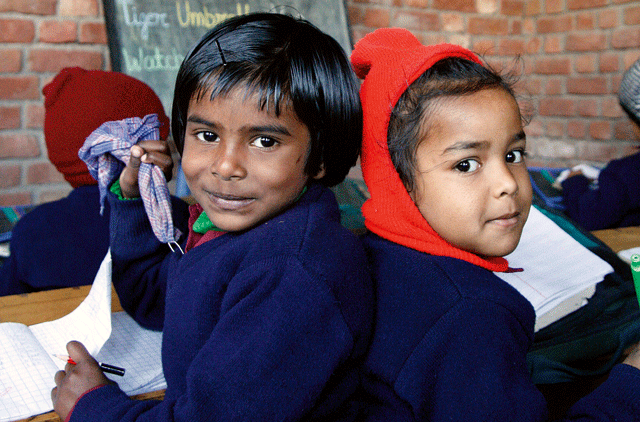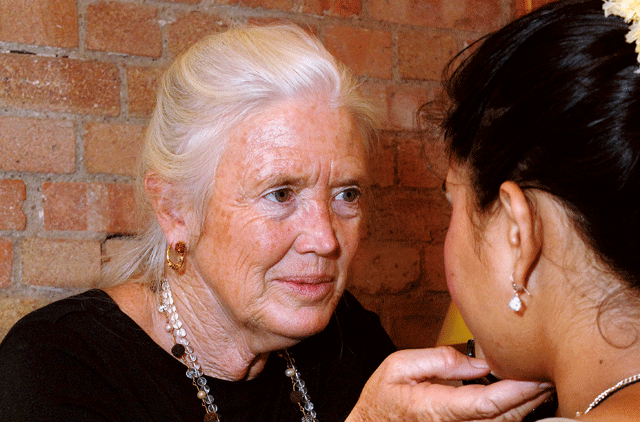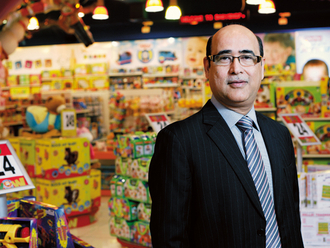
When I set foot in Rishikesh, a sleepy little town in the northern Indian state of Uttarakhand, on a warm April morning earlier this year, I had a specific goal. It was to capture the humanitarian work of a Westerner who has made India her home. As I made my journey to Rishikesh, another thought came to my mind. I asked myself how different this encounter was going to be. Was I ploughing just another track in the same field? But a voice in my head said, "Every track in a field needs to be ploughed to yield a rich harvest."And so with reaffirmed enthusiasm, I set off to meet Prabhavati Dwabha.
Soon I arrive at a complex that had a group of cottages shaped like pyramids in Tapovan, a suburb of Rishikesh. The complex includes a school, an organic cafe, residential quarters for students and a few volunteers. The cottages, made with locally sourced bricks and wood, are covered with tarpaulin sheets and a mesh to keep elements and insects at bay.
As I enter Dwabha's cottage, I notice the tastefully done interior. Local cotton fabrics have been used. As I take in the colour and artistic touches, Dwabha, a graceful, silver-haired woman with a warm smile enters the room. But she has an immediate request. She says, "Can you wait a while please? I'm sending the cows to the mountains because I fear the heat could make them ill (it's 32˚C in this otherwise cool mountain town). You'll have to stay indoors while we coax the cattle into the truck for the journey," she explains with a smile.
This kind of pastoral pursuit would never have been a part of Dwabha's life had she not experienced a series of serendipitous moments that set her on this path and eventually led to her present life in Rishikesh.
Maggie O'Hara (Prabhavati Dwabha's original name) came to Pune, India, for the first time in 1978. She was a woman escaping from a fragmented life. As a struggling actress in Hollywood, O'Hara was looking for anchorage, but that seemed to elude her then. As she continued to audition for roles, one day she read out, as part of an audition, a chapter from one of Osho Rajneesh's (a famous Indian motivational guru) books.
Such was the impact of the words she read that as she stepped out of the studio, she didn't care if she had bagged the role. Something far more important had happened to her - she found herself wanting to visit the Rajneesh ashram in Pune, India.
Once in Pune, Dwabha found herself surrounded by a community of seekers. With every passing day she was convinced that she wanted to make India her adopted home, but her resources were limited. She decided that she needed to return to the US to make some money, in order to guarantee a future in India.
So she went back to Venice Beach, California, where she had lived as a struggling actress. She remodelled her house and sold it for a decent profit. She flew back to Pune and lived at the ashram until the money ran out. For the next few years she travelled in and out of Pune as she found ways to earn money through Reiki workshops and selling batik boutique clothing with the help of a friend - among other endeavours.
When Osho Rajneesh passed away in 1990, Dwabha found herself another mentor, Shri Punjiaji, affectionately known as Papaji, who asked her to move to Rishikesh where she began living in a cave next to the river Ganges. Dwabha did all she could to sustain herself, physically and spiritually. "I grew my own vegetables, gathered wood to cook food, washed my own clothes and lived each day with conviction."
She was waiting for a fundamental shift in her life's perspective to occur but what began to impact her was the poverty of the local people, their poor health, malnourishment and illiteracy, particularly among the children. "I desperately wanted to do something for them," she says.
As the children began visiting her out of curiosity, she held impromptu English language classes for them along with demos of practical skills like mending their torn shirts or sewing a button. Dwabha picked up basic Hindi and used sign language to communicate with them as well.
Such was the deprivation of the local people that her simple life in comparison seemed to be brimming with abundance. "It made no sense to me that they had so little food when I grew vegetables in abundance. They grew only grains on their tiny patches of land, so I taught them to nurture waste-water vegetable gardens."
Once cottage farming took off, it was easy to teach them the basics of nutrition and its impact on their health. But Dwabha was not entirely satisfied. "Although these interactions began to help them in small ways, I felt like I wasn't making a significant impact on their lives. So, dejected and helpless, I decided to pack up and return to the US."
A few days before she was due to leave, Dwabha went for her daily dip in the river and when she returned ‘home' she found the river had flooded it and every single possession of hers had been washed away. "I just stood there and sobbed," she says. The tide had turned. In a matter of minutes, the villagers whose children used to come by everyday brought her everything she would ever need and then some. From a charpoy, to earthen utensils, wood for fuel, vegetables, rice... she had all she needed to start again.
"I had never felt so rich and so humbled in my whole life." The villagers' love changed the course of her life. "They gave freely to a stranger without a thought to their own survival; their only concern was that they could not give me enough!"
Dwabha realised that the purpose of life that had so far eluded her was now squarely in her grasp. Helping people improve their living conditions became her mission. "I realised that I could never abandon these people," she says. So when she left India this time, it was to source a means of funding that would sustain the locals and her dream for good.
Her interactions with people at the ashram in Pune in the early years in India had helped her form a network of volunteers who worked for non-profit organisations. She sought their help and eventually in 1993, she decided to partner with Interveda, a Spanish NGO.
Armed with funds, she returned to Rishikesh in 1994 and began with one small free clinic and a primary school. She says, "It was amazing how much I could do with so little money. Within a year, there were two clinics and five weekly medical camps in remote villages. Things seemed to improve if I could just trust and keep saying yes."
Within six years, Dwabha had 13 primary and two elementary schools - now going on four - up and running. Six hundred children were enrolled collectively. Six hundred hot lunches were being served to these children who earlier got by, if they were lucky, with scraps of food.
"We provided assistance to 68 below the poverty line villages, serving a population of 12,000. The project extended from education to healthcare, organic farming and women's vocational training."
The schools were housed in either existing rundown government buildings or they relaunched schools that had remained unused for lack of infrastructure, books, teachers and sometimes even students.
"We built toilets in every school, put in desks and gave uniforms, including sweaters and shoes to the children. In some of the schools, we put in water tanks, kitchens and additional classrooms."
Of the 13 schools Dwabha set up, four closed due to lack of support but the others are flourishing. In 1997, Dwabha set up Ramana's Garden and the orphanage. Another school, The Rishikesh Sishamjari school, in the slums of Rishikesh, is one of the biggest not-for-profit schools in the area with 580 students.
"The only condition we put forward to run these schools was that children from socially discriminated families be given free admission and be allowed to share the mid-day meal with students of other castes."
Discrimination has no place in Dwabha's schools. And if they found that a family was only sending their male children to school, while keeping the girls from an education, the boys would be denied admission.
"Initially there was a lot of resistance but gradually the schools filled up. Luckily the Uttar Pradesh government decided to take all 13 schools under their wing. That was a huge relief for me."
Today of the schools set up, Ramana's Garden is the only school that Dwabha runs (the others are being run by the UP government and other foreign NGOs). The only English-medium school in the area, Ramana's School is free of cost and has 189 students. A staff of 12 teachers teaches a core syllabus of maths, science, social studies, English and Hindi, plus music, arts and crafts and Indian classical dance. All students study computer science from the third grade onwards. The children are a moving force of grit and persistence as many of them live in difficult circumstances.
From violence to abuse to abject poverty to one-parent families, many of them are pushing beyond their harrowing living conditions to get an education. In the day-and-a-half I spent at Ramana's Garden, I saw no signs in the children that their background had irreparably scarred them. "Whenever a new child joins the orphanage and school, we do go through a process of finding out about his or her personal issues. Patience and skilful interaction are handy but it's amazing just how being in the midst of other children engulfs them in a security blanket," says a teacher.
One such child is Lucky. A five-year-old, he was just three when the police informed Dwabha that his parents and sister had all passed away in a road accident.
"He could barely speak or give his name and so we just named him Lucky. We try not to take babies under the age of four but when you see one wrapped in a torn plastic sheet left to die near the garbage or a drain, there's not much choice left for us," she says.
Though setting up Ramana's Garden in 1997 was not an easy task, today it is a testimony to Dwabha's conviction. The school has volunteers from many parts of the world.
Angelous Santos from Spain is on a two-year voluntary stint helping out with the school's management.
Mayur Patel, a US student of Indian origin, helps out in the cafe (that serves food made from the organic produce grown on the farms and donated by a patron).
Kaita Bliffert is also a student from the US who helps out. All three live on the premises and interact with the children on a continuous basis.
Gopaldas, a Frenchman who holds the fort in Prabha's absence is a constant presence. Sarah Mostafa Kamel, from Egypt, who's in Rishikesh to learn yoga and ayurveda after graduating from a Canadian university spends her evenings here and either teaches the children arts and crafts or takes them to the river for a swim on most days. "My life has changed in the most beautiful way by volunteering here," says Kamel. "I see children who come from broken backgrounds live with such enthusiasm and energy that it is practically infectious."
It is a sentiment echoed by the rest of the volunteers and in the endorsements on their website (www.sayyesnow.org). There are even testimonials from those sent as volunteers as part of a programme facilitated by the US based non-governmental organisation, Leap Now.
From 1997 to 2000, Ramana's Garden was run under the Interveda banner. In 2000, Dwabha set up her own NGO, Ramana Seva Samiti that now began to oversee all operations. The Samiti also runs an organic farm. "This is presently our lifeline to keep our children fed," says Dwabha.
The Ramana's Garden Gallery Café, the organic food place, is a cosy retreat that doubles as a showroom and a sales outlet for arts and crafts - shawls and costume jewellery - made by the students. People spend large chunks of time soaking in the serenity while reading a book as they enjoy fresh, organic food.
But even here, the effects of global warming are being felt, says Dwabha. While in the early years, they could grow food in their farm all year long, now they can do that for five months a year. This may explain her anxiety to transport her cattle to the mountains for fear of them falling ill in the heat!
Apart from Ramana's Garden, Dwabha also runs two other schools up in the mountains near Rishikesh, while her husband Johnson Oliappuram, who she met as a volunteer during her initial years setting up the school projects in Rishikesh, runs a school in Kerala.
Such is the commitment of the couple towards their projects that they already have a succession of plans in place. The local women have been trained to run the schools.
A happy spin-off of Dwabha's efforts to empower local women is the Mahila Semakia or Women's Self-Help Groups. Started in 1997, today it has five self-help groups of 32 local women collectively who support their families with income generated through their craft - Angora rabbit wool-weaving and hand-knit sweaters for the schoolchildren. Their wool craft is also for sale for tourists and visitors. Ramana's Garden Café stocks some lovely lightweight shawls
Ramana's Garden and the orphanage currently require $50,000 (about Dh183,600) a year as running costs which includes salaries for the staff, stationery, books, uniforms, medicine, mid-day meals and the running costs of the orphanage.
In addition, the two schools in the mountains cost another $2,500 per year (about Dh9,182). She is hoping to increase student enrolment by 24 more children and to add six rooms to the dormitory. The more children she can take in, the less the number of young lives wasted.
"It makes a critical difference when these kids get an education that will secure their future and that of the environment they serve. If every individual contributes towards a cause, it's not a huge sum that is required from them. Together, they can make a difference."
How you can make a difference
The mission statement of Ramana's Seva Samiti is Say YES (Youth, Education Service) and NOW (nutrition, opportunities, women's vocational training). The organisation believes that every child regardless of caste, creed, or social-economic background has the right to quality education, proper nutrition, and primary healthcare.
It does not matter if volunteers do not have specific skills. What is needed is their fondness for children and their ability to empower them with learning. They need to stay for a minimum of two months, but if they would like to stay forever, they can.
For more info, email: dwabha@hotmail.com or choosingyesnow@yahoo.com












